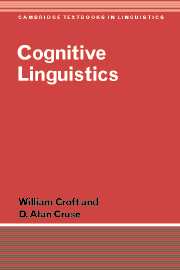Book contents
- Frontmatter
- Contents
- Figures
- Tables
- Preface
- 1 Introduction: what is cognitive linguistics?
- A conceptual approach to linguistic analysis
- Cognitive approaches to lexical semantics
- 5 Polysemy : the construal of sense boundaries
- 6 A dynamic construal approach to sense relations Ⅰ: hyponymy and meronymy
- 7 A dynamic construal approach to sense relations Ⅱ: antonymy and complementarity
- 8 Metaphor
- Cognitive approaches to grammatical form
- References
- Index
- Index
8 - Metaphor
Published online by Cambridge University Press: 05 June 2012
- Frontmatter
- Contents
- Figures
- Tables
- Preface
- 1 Introduction: what is cognitive linguistics?
- A conceptual approach to linguistic analysis
- Cognitive approaches to lexical semantics
- 5 Polysemy : the construal of sense boundaries
- 6 A dynamic construal approach to sense relations Ⅰ: hyponymy and meronymy
- 7 A dynamic construal approach to sense relations Ⅱ: antonymy and complementarity
- 8 Metaphor
- Cognitive approaches to grammatical form
- References
- Index
- Index
Summary
Figurative language
Prototypical figurative language will be characterized here as language use where, from the speaker's point of view, conventional constraints are deliberately infringed in the service of communication, and from the hearer's point of view, a satisfactory (i.e. relevant) interpretation can only be achieved if conventional constraints on interpretation are overridden by contextual constraints.
What is the motivation for figurative uses of language? Here we need to distinguish the speaker's motivation for using an expression figuratively, and the hearer's motivation for assigning a figurative construal to an expression. Briefly, a speaker uses an expression figuratively when he/she feels that no literal use will produce the same effect. The figurative use may simply be more attention-grabbing, or it might conjure up a complex image not attainable any other way, or it may permit the conveyance of new concepts. As far as the hearer is concerned, the most obvious reason for opting for a figurative construal is the fact that no equally accessible and relevant literal construal is available.
The major types of figurative usage are metaphor and metonymy. Metaphor and metonymy both involve a vehicle and a target. Metaphor involves an interaction between two domains construed from two regions of purport, and the content of the vehicle domain is an ingredient of the construed target through processes of correspondence and blending. For instance, in (1) (from Patricia Cornwell's Black Notice) the speaker's mental processes are presented as having simultaneously the character of thoughts and small sinister creatures:
A myriad of ugly, dark thoughts clung to my reason and dug in with their claws.
- Type
- Chapter
- Information
- Cognitive Linguistics , pp. 193 - 222Publisher: Cambridge University PressPrint publication year: 2004
- 2
- Cited by



